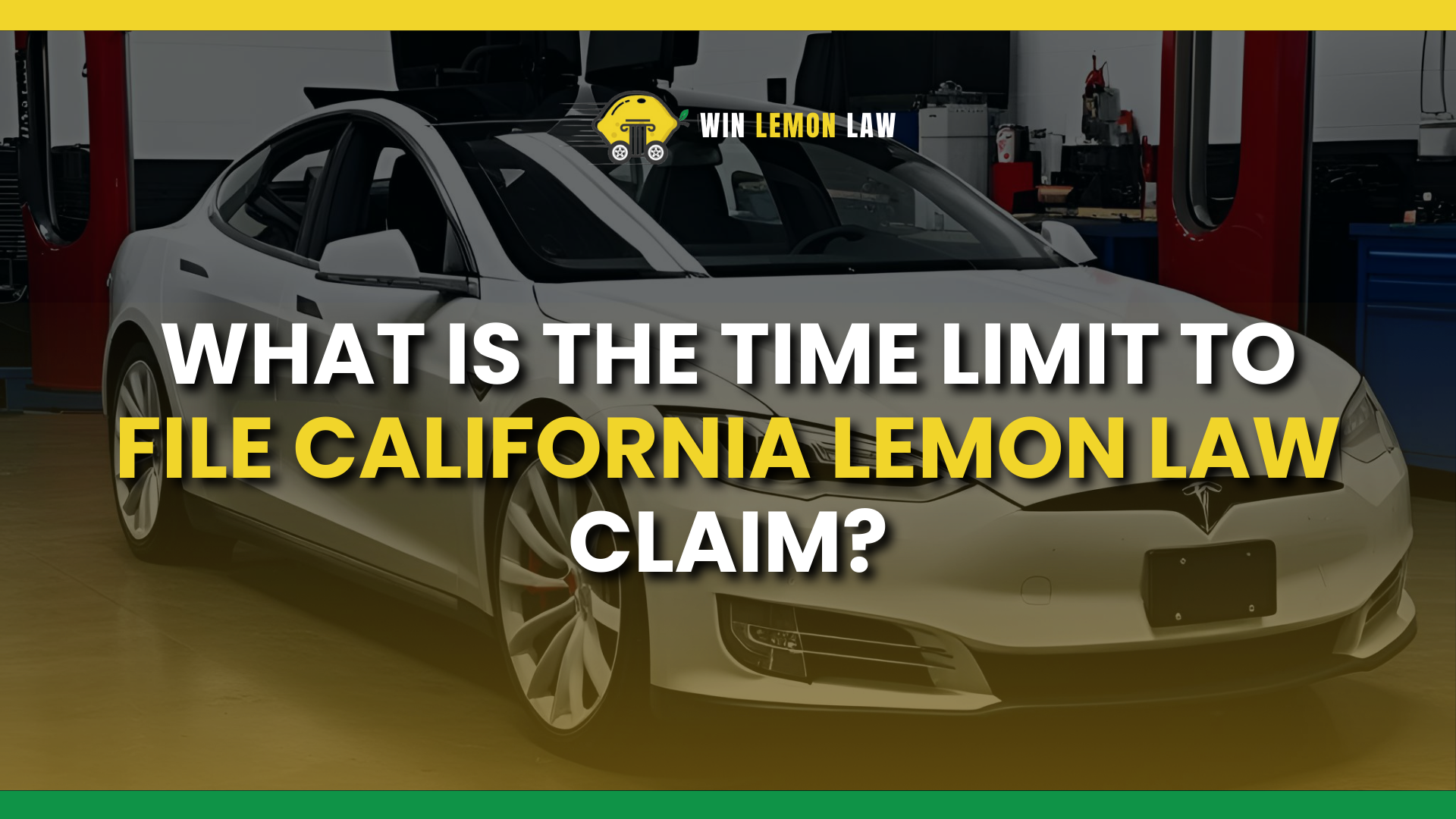When it comes to protecting your rights under California’s Lemon Law, one of the most crucial aspects to understand is the time limit to file a claim. Many vehicle owners are unaware that the clock starts ticking as soon as they discover or should have discovered a defect in their vehicle. Whether you’re grappling with persistent engine problems, frequent transmission failures, or unresolved safety issues, knowing the Lemon Law time frame can make or break your ability to pursue compensation or a remedy for your defective vehicle. Understanding these time limits and what triggers them is not only vital for your peace of mind but also for ensuring that your legal rights are protected before time runs out.
In this article, we’ll examine the key elements of California’s Lemon Law time limits, including how long you have to take legal action, what to do if you miss a deadline, and the importance of keeping detailed records. We’ll also explore what constitutes a “lemon,” the documentation needed to file a claim, and the different types of compensation you may be entitled to. By the end, you’ll have a clear understanding of how the Lemon Law works and how to protect your rights under it.
Understanding the California Lemon Law

California’s Lemon Law, part of the Song-Beverly Consumer Warranty Act, protects consumers who purchase or lease new vehicles with an express manufacturer’s warranty. This law applies when a defect substantially impairs the vehicle’s use, value, or safety, and the manufacturer is unable to repair the issue after a reasonable number of attempts.
The Lemon Law applies throughout the warranty period, but a specific guideline known as the Lemon Law Presumption may apply if problems occur within the first 18 months or 18,000 miles. These issues include:
- Four or more repair attempts for the same problem
- Two or more attempts for a serious safety defect
- The vehicle is out of service for repairs for more than 30 cumulative days
In such cases, the vehicle may be legally presumed to be a “lemon.” The statute of limitations to file a Lemon Law claim in California is four years from the time you discover or should have discovered the defect.
Understanding these protections is crucial for any California vehicle owner dealing with recurring warranty-related problems.
Lemon Law Time Limits and Filing Deadlines
While the Lemon Law Presumption may help strengthen a case, it does not override the statute of limitations. Under California’s Lemon Law, consumers generally have four years from the date they discover the defect to file a claim. However, under new regulations in 2025 (AB 1755), manufacturers who opt in may limit this to one year after the warranty expires or six years from the vehicle’s delivery date—whichever comes first.
Missing these deadlines can result in losing the right to pursue a refund, replacement, or compensation.
It is critical for vehicle owners to act quickly, keep thorough records, and consult a legal expert if delays occur. Documentation, repair history, and prompt action are essential to protecting your consumer rights under the Lemon Law.
The Lemon Law Claim Process and Documentation

Building a strong case begins with understanding the Lemon Law claim process and gathering solid documentation. Maintain detailed records of repair orders, service invoices, and all written communication with the dealership or manufacturer. These documents will support your Lemon Law claim, showing both the recurrence of the defect and the manufacturer’s inability to resolve it.
For example, if you had multiple transmission repairs, each visit becomes evidence that demonstrates a pattern of unsuccessful repair attempts. Detailed records are essential for proving that the vehicle qualifies for a Lemon Law claim.
While it’s possible to file a claim on your own, working with an experienced Lemon Law attorney can increase your chances of success. These professionals are well-versed in manufacturer defenses, deadlines, and settlement negotiations. Under California law, if your case is successful, the manufacturer is typically required to cover your attorney’s fees and legal costs, allowing you to secure expert representation without upfront costs.
Options for Resolution
If your vehicle qualifies under California’s Lemon Law, you may be entitled to various forms of compensation. Depending on the situation, the manufacturer must either replace the defective vehicle or refund the purchase price—whichever option you prefer.
In addition to a refund or replacement, the manufacturer may also be responsible for covering incidental costs you’ve incurred due to the vehicle’s ongoing issues. This could include rental car expenses, towing fees, and other reasonable out-of-pocket costs related to the defect.
Some consumers might opt for a cash settlement instead of a full buyback or replacement, particularly when the vehicle remains operable but has diminished value.
Navigating these options is a critical part of the Lemon Law claim process, and having legal guidance ensures that you fully understand your rights and available remedies. If you’re uncertain about the best course of action, Lemon Law attorneys often offer free case evaluations to determine the most effective resolution for your situation.
Consumer Protection and Legal Support

Understanding your rights is only part of the equation—having the right legal support can make all the difference in a successful Lemon Law claim. Navigating the claims process, negotiating with manufacturers, and adhering to legal deadlines is much easier with experienced representation on your side.
Many law firms specializing in Lemon Law in California offer free consultations and work on a contingency basis, meaning you pay nothing unless your case is successful. This enables consumers to pursue justice without financial barriers.
Experienced Lemon Law attorneys focus exclusively on helping consumers understand their legal rights, build strong claims, and hold manufacturers accountable. From reviewing repair records to negotiating resolutions, legal professionals play a crucial role in guiding vehicle owners through the process.
Whether you’re unsure if your case qualifies or you’re ready to move forward, a free case review is a smart first step toward protecting your rights and securing the compensation you deserve.
Impact of Lemon Law on the Automotive Industry
California’s Lemon Law has significantly impacted how automakers handle quality control and customer service. The threat of legal consequences and costly buybacks has motivated manufacturers to respond to defects more quickly, improve internal testing, and take customer complaints more seriously.
High-profile issues—such as transmission failures in Ford vehicles or faulty components in Toyota and GM models—have shown that failing to address recurring defects can result in lawsuits, recalls, and damage to brand reputation. Consequently, manufacturers have become more proactive about addressing warranty claims and increasing transparency regarding known issues.
The Lemon Law has also reshaped consumer expectations. Today’s vehicle owners demand quicker, more reliable solutions when problems arise, and they are more aware of their legal rights. For automakers, complying with Lemon Law obligations is not just about avoiding liability—it’s an opportunity to rebuild trust and foster long-term customer loyalty.
Common Challenges and Tips
One of the most common mistakes in a Lemon Law claim is missing the statute of limitations or failing to maintain thorough documentation. Many vehicle owners delay reporting problems or have repairs conducted by unauthorized service centers—both of which can weaken their Lemon Law case.
To protect your rights under California’s Lemon Law, it’s vital to report any issues promptly to the manufacturer or an authorized dealership. Avoid unauthorized repairs, as these can void warranty protections or make it harder to establish a consistent repair history.
Delaying the reporting of vehicle defects or waiting too long to initiate a claim could prevent you from obtaining the legal remedy you deserve. The protections offered by the Lemon Law are only enforceable if you act within the prescribed time frame. The typical time limit is four years from when you first experienced warrantable issues, but each case varies depending on documentation and repair history.
Keeping detailed records of every repair attempt, service invoice, and communication with the dealer greatly increases your chances of a favorable outcome. If you’re unsure whether your situation qualifies or you’re overwhelmed by the legal process, consulting with an experienced Lemon Law attorney is highly advisable.
Whether you’re asking how long the Lemon Law lasts or how long it takes for a Lemon Law case to conclude, legal professionals can help you meet filing deadlines, evaluate your eligibility, and advocate for the compensation you deserve.
Closing
If you’re dealing with a defective vehicle and unsure whether you’re still within the California Lemon Law statute of limitations, time is of the essence. Don’t risk losing your right to compensation, a replacement vehicle, or a refund due to missed deadlines. Reach out to our team of experts at Win Lemon Law, where we can quickly evaluate your case and help guide you through the legal process. Our experienced attorneys understand the nuances of Lemon Law claims and will work tirelessly to ensure that you receive the justice you deserve. Contact us today to protect your rights before time runs out.

